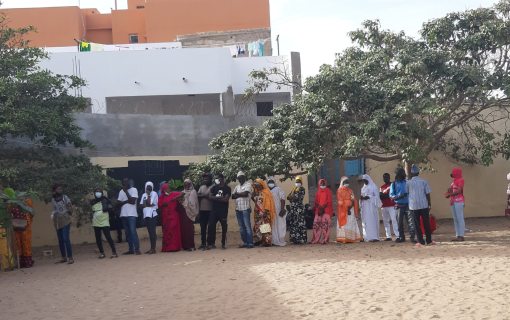Technical Assistance to Senegals 1996 Regional, Municipal and Local Elections
INTRODUCTION
Senegal is one of the few countries in West Africa with a pre-independence tradition of organizing elections. In fact, an important characteristic of French colonialism in the region of Saint Louis was local elections of administrative leaders. Since independence, in 1960, Senegal has held periodic elections, although all elections from 1963 through 1978 were contested by a single party (Union Progressiste Senegalaise -UPS - which later became Parti Socialiste -PS). Since the 1978 presidential elections, efforts have been made to open up the political system to be more pluralistic and inclusive of political parties in implementation of electoral activities.
Senegal has, since 1960, attempted to decentralize its power structures to ensure a greater and more even development at the grassroots level. In 1960, for example, a Statut de Commune was adopted for all the regions in the country. In 1966, a Code de l'Administration Communale was promulgated and in 1972 rural community administrative authorities were created under the management of Vice Prefects. Law # 90, of October 8, 1990 conferred on elected local officials the governance of municipal and local administrations through a five-year term. The entire country was divided into 10 regions, 48 townships and 320 rural communities, totaling 378 administrative authorities.
Depending on the size of a town, mayors and deputies were elected by respective municipal councils comprising of 20 to 90 members; and rural communities were governed by presidents and vice-presidents who were elected by the members of the rural council which ranged from 16 to 28 members. The elections of these local leaders were through a winner-take-a11 party list system with no preferential votes or coalitions permitted. The last municipal and local elections were held on November 25, 1990. The ruling PS won all the municipal and rural seats during the 1990 elections which were boycotted by several opposition parties due to allegations of fraud.
On February 5, 1996, the National Assembly passed a decentralization bill, which was subsequently ratified by the President of the Republic, promulgated as Law # 96-06. The objective of this decentralization law was to speed up the development of the country at the local level and engender grassroots decision-making through regionalization.
In addition to the existing 378 administrative authorities, 12 new municipalities and 43 new arrondissements in Dakar Region were created, thus making Senegal to consist of 433 local administrative authorities. The governing of these local administrative authorities is to be the responsibility of councilors which are to be elected through a universal suffrage. Local, municipal and regional elections were therefore held on November 24, 1996 to fill the respective councilor seats.
The elections of November 24 were important landmarks in Senegalese politics in that they represented the first test of the Electoral Code on local and municipal elections. The complete revision of the Code by the Commission Cellulaire de la Reforme du Code Electoral (Reform Commission), has been praised for the consensus manner in which the Code was revised. However, there has not been any local elections to confirm its practicality and effectiveness.
Another important characteristic of the local, municipal and regional elections was that they serve as a prelude to test the popularity of candidates and political parties for future elections: possible senatorial elections of 1997; legislative in 1998; and presidential in year 2000. As Senegal passes through a transition from a system of "traditional decentralized administration" and moves into an era of "new local governance" it is widely believed by political parties that "qui gere les collectivites locales gere I'Etat". Thus, 1996 elections were seen by all the political parties as an instrument for party-building and training ground for future national office holders.
Read the Full Report.









